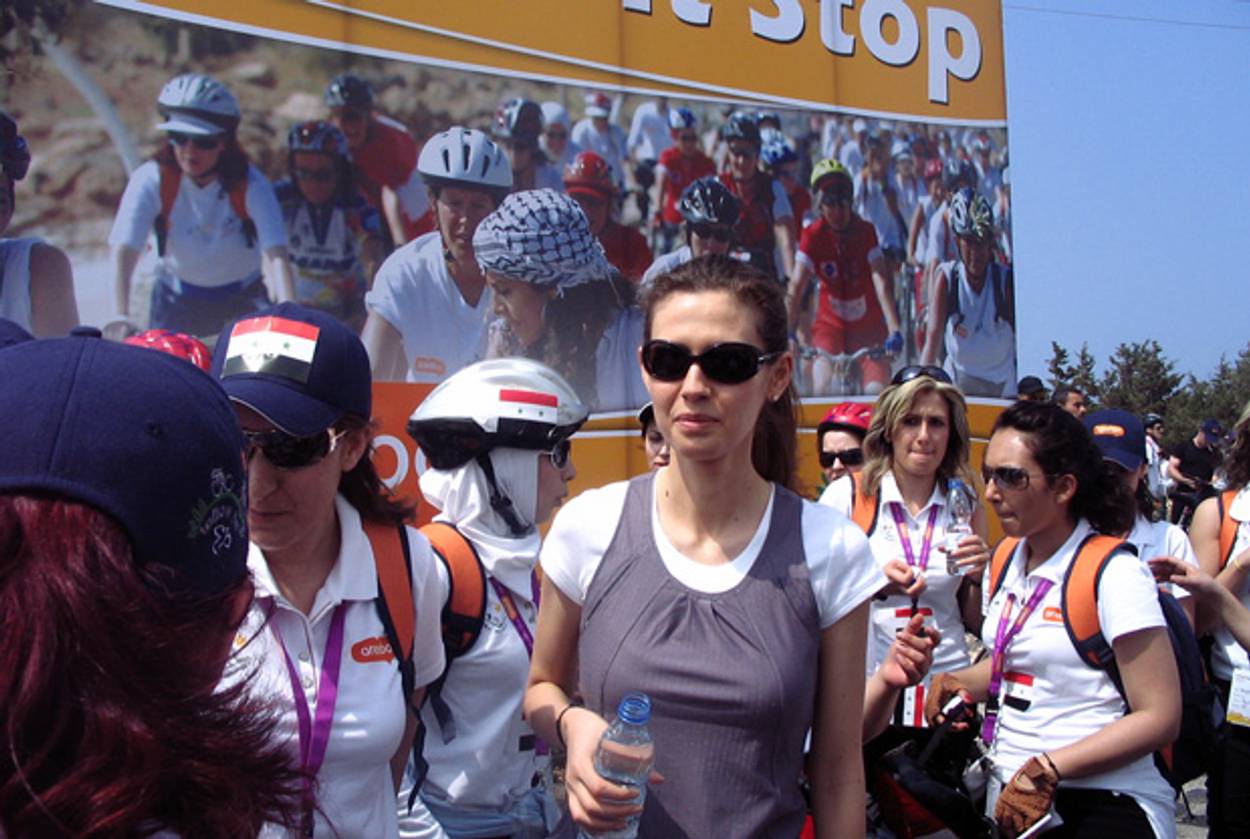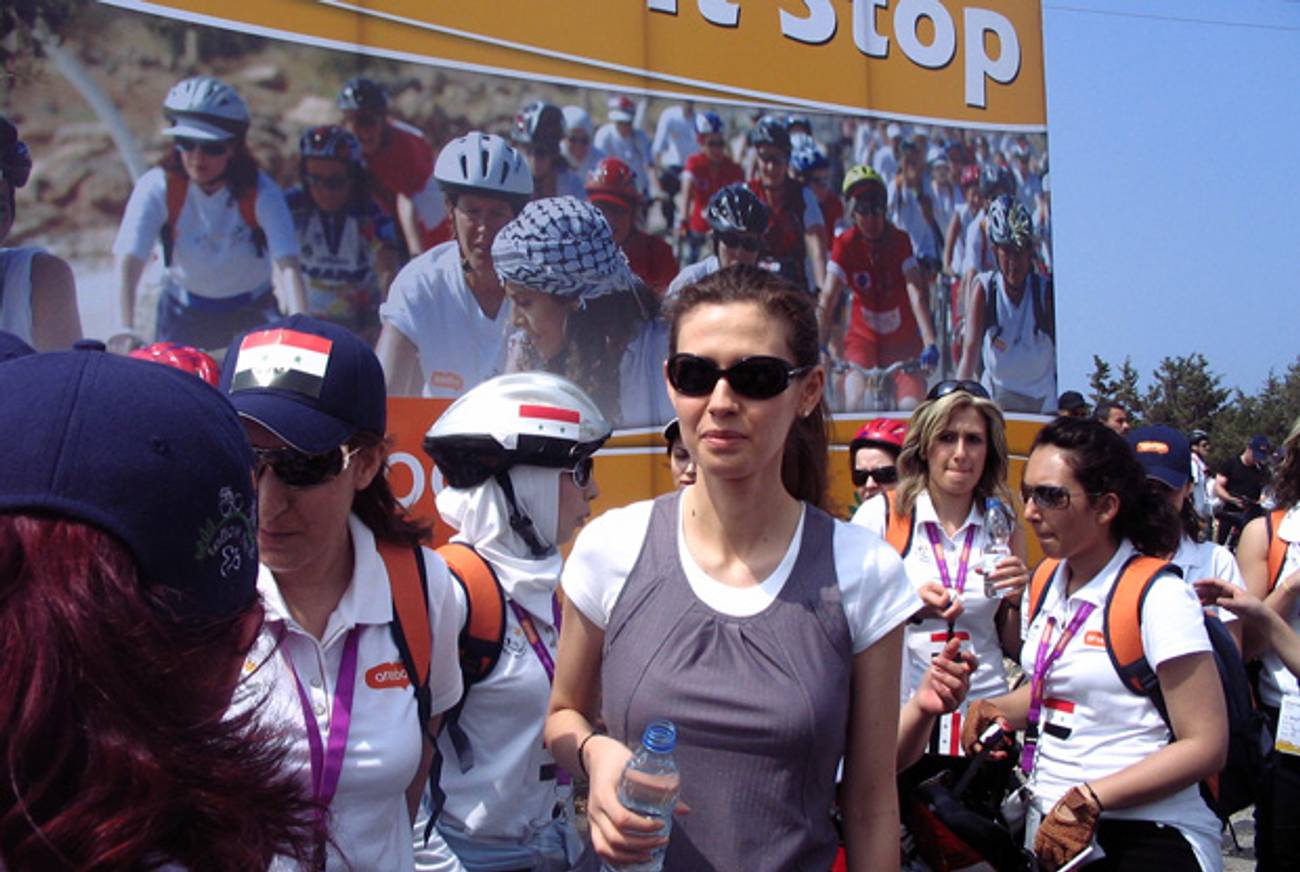The Tyrant’s Wife
As Syria’s first lady stands by her murderous husband, an Iranian activist remembers the Asma al-Assad she met on bike rides for peace




Dear Asma,
It’s been five years since we last saw each other, but as your country has burned at the hands of your husband over the past year, I, along with the rest of the world, have wondered where you’ve been amid this madness. Then, late last week, I saw that you had finally broken your silence by emailing a British newspaper to express your support for your husband, Bashar al-Assad.
As your countrymen are being tortured and murdered by the regime that bears your last name, I imagine the trips we took together are far from your mind. But I am writing to remind you of the experiences we shared—and of the Asma I once knew—when we, along with 300 other women, came together to promote peace in the Middle East by biking across the region.
We first met in your palace in Damascus in 2005. You looked beautiful; as always, you were dressed in the most fashionable clothes. The last rays of the September sun streamed in from the balcony and onto your hair, perfectly styled, as you spoke to 300 women who were in Syria to “cycle for peace” on a trip run by a group called Follow the Women. The American, British, German, Spanish, Italian, Jordanian, Lebanese, Danish, Belgian, Turkish, and other women had signed up to cycle hundreds of miles across Syria, Lebanon, Jordan, and the Palestinian territories, and the visit to your palace was our first stop.
I was the coordinator of Iran’s delegation. Even though our government forbade us from participating openly in such activities—especially from affiliating with any organization that mentioned peace between Palestine and Israel—we managed to coordinate everything underground to keep safe. We flew separately into Syria and didn’t speak about our plans with anyone.
You welcomed us to your homeland, Asma, and spoke of the necessity of peace. You emphasized that your aim was to spread a message of tolerance and spoke about the organizations that you established for women, children, and education. You reminded me of Farah Pahlavi, the last empress of Iran. She was the pioneer of social development in Iran in the 1970s while her husband, the shah, was too busy with politics and oppressing the opposition. I had heard so much about the Assad family’s brutality—especially your father-in-law Hafez al-Assad’s 1982 massacre in Hama. You seemed so different.
The next time we met, on another trip for peace in 2007, you were on your bike, cycling with us in a small village near the Syrian port city of Latakia. You wore light gray-and-white sports clothes and trendy sunglasses. For part of the route, we rode next to each other, and we started to chat. You expressed shock when I told you that I was participating in the event as an Iranian: After all, I wasn’t wearing a hijab, and I was biking “for peace” on behalf of a country whose regime wants to wipe Israel off the map. I spoke with you in Arabic, the language I learned in Damascus University in 2004, but you preferred to answer me in English, which you learned growing up in London.
We discussed the Iranian government and Iranian President Mahmoud Ahmadinejad. You wondered if Ahmadinejad, who had been in office for only a year, would be a reformer, perhaps by allowing Follow the Women to ride in Iran. I told you that such a change would be “impossible” as long as he was president. You tried to tell me that Syria was more developed and freer than Iran and asked me if I believed any change was coming to my country. I stared into your eyes and said in Arabic, “My land is yours, or your land is mine.” In Arabic, the phrase “My land is yours” is used as a sign of respect. By turning it around, I wanted Asma to understand that so long as dictators remained in power, there would be no change in either of our countries. You just smiled politely and biked ahead, joining some other riders.
At our first stop, you happily took pictures with the American delegation, eager to show them your open-minded attitude. At our second stop, in a small village, people came out to see you. Your security escort tried to scatter the people, but you asked them to leave you alone with the children. You kissed them, patted them on their heads, and talked with them. You inspired me with your kindness and humility. I took pictures to remember the moment—images that these days make me disgusted.
I left Iran two years after our last bike trip. In 2009, I was investigated by the Iranian intelligence ministry for a book I had been working on about Iranian Jews after the 1979 revolution. The ministry told me that they had evidence that I was working for an Israeli organization and that I was publishing propaganda for the Jews. Under Iranian law, such a crime is punishable by execution. So, I left my country and my family with no idea of when I would return. Now I am living in exile. But when I hear the stories of those fleeing Syria, Asma, I realize I am lucky. Over the past year, more than 8,000 Syrians have fled to Turkey because of your husband’s brutality.
You are not the same woman who once spoke to me about the plight of children in Palestine and elsewhere. A river of blood, including that of children, runs through your country. It’s hard for me imagine your hands blood-soaked, but your family is behind this ongoing massacre.
Asma, you are a mother, so how can you stand by a man who gives the orders to execute entire families in their homes? How can you sing lullabies to your daughter and son when so many Syrian mothers, especially in Homs, now have no one to sing to? How can you sleep in a bed with a man who has mastered the dark arts of torture and murder?
Awaiting your reply,
Parvaneh
Parvaneh Vahidmanesh, an Iranian human-rights activist, is a program officer at Freedom House in Washington, D.C.
Parvaneh Vahidmanesh, an Iranian human-rights activist, is a program officer at Freedom House in Washington, D.C.